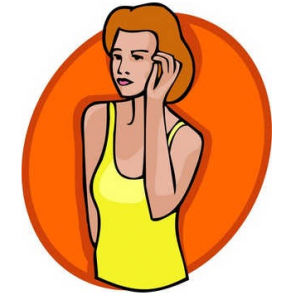Hello Ana. I have a question. When you say “I didn’t catch your name”, that means the other person has already told you his name, and you’ve just forgotten it? or Can I use it even if the person hasn’t told you the name?
Hi Ricardo – Yes, that’s what it means. However, some people say that even when you haven’t told them your name yet..
Hi, Ana!!!
Great podcast as usual!!!
And oh man!! That happens pretty often with me. I don’t usually have trouble understand people in a face to face conversation but over the phone, it is indeed a challenge. Getting everything that the other person is saying gives me a hard time sometimes. Here’s a little story:
I got a flat tire yesterday– I somehow drive over a nail and today I called a place that would repair my tire, fine so far. The man that answered the phone started speaking really fast and using a lot of slangs, I was able to get everything except for ” .. Down here.. Swinging by..” ?? WHAT?
I asked him to reapet 3 times before I got what he was trying to say. He was just asking in a informal way when I was planning to go there! Ufa!
In the USA, people usually dont slow down when speaking to someone, even though they sometimes notice that you are from another country.
Because I was having trouble understand that person, he gave up making my appointment and said he did, but well, once I got there I had to wait 2 hours because there wasn’t any info on their computer.
Tip: always ask others to repeat if you weren’t able to catch what was said. And most important- make sure they get what you are saying too and insist if necessary, I am sure that every misunderstanding can be repaired and we all laugh about it later!
Have a great week, Ana!!
Lots of love from California- USA.
Hi Anne,
Great story :-( and very real :)
Yep, that was my experience in the US – people usually won’t slow down even when it’s apparent you’re a foreigner and not fully getting what they’re saying.
That is a great tip – ask that person to repeat what they said; and make sure they understood what you said. You can say – “Just to be clear, etc etc”
Thanks Anne!! x
Hi Ana Luiza! While living in the U.S. people would be like “what’s that?” Whenever they didn’t understand me. Did I get it right? I though it was a very common expression and also that it fits the situation this post is about.
Hi Isabela,
Yes, that was the case for me too. My classmates would always say “What’s that?” – it slipped my mind while writing the podcast :)
Where did you live, by the way?
Hi Ana. Can I use “what did you say?”. I remember that my american roommate used to say that when he was here. It sounds like “whad you say”.
Lucas, vc já sabe a resposta :)
Hi Ana!! Can I use “sorry?” Is it a common expression too? And which is more formal? Thanks!!
Yes Deb, you can say “Sorry?” – that’s very common as well. It’s not particularly formal.



 Hi, everyone. This is the new episode of the Inglesonline podcast. Please subscribe to this podcast using the Podcasts app for iPhone or iPad, or listen to the episodes using the
Hi, everyone. This is the new episode of the Inglesonline podcast. Please subscribe to this podcast using the Podcasts app for iPhone or iPad, or listen to the episodes using the